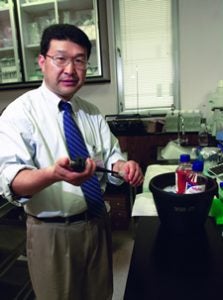Grant to fund study of possible asthma treatment from crabs
An East Carolina University researcher has received $920,999 from the Department of Defense to continue his studies in treating childhood asthma.
Dr. Yoshimi Shibata, research associate professor in the Department of Physiology at the Brody School of Medicine at ECU, was recently notified of the Department of Defense Peer Reviewed Medical Research Program grant.

Dr. Yoshimi Shibata hopes to connect shellfish and asthma treatment. Photo by Cliff Hollis
The title of his research is “Oral Administration of N-acetyl-D-glucosamine Polymer Particles Down-Regulates Airway Allergic Responses.” It focuses on finding a way to decrease asthma attacks in children by boosting their immune systems by introducing carbohydrates purified from crab and shrimp shells.
Why crabs and shrimp? “Because people who have had an infectious lung problem like tuberculosis are protected against asthma,” he said. “The BCG (Bacillus Calmette-Guerin) vaccine for TB shows some protection against asthma. We are trying to learn what’s in the BCG that does this, and we’ve discovered that the shells show some similar effects to BCG.
“The crab shell carbohydrate is non-infectious and still offers the protection,” he said.
Crab shells contain carbohydrates, calcium and proteins, Shibata explained. He and Dr. Quentin Myrvik, president of Myrvik Enterprises in Southport, designed the active carbohydrates by removing the calcium and proteins. “We make small particles with the carbohydrates similar to bacteria, which are called mimetic microbes. We will give this orally to experimental animals then eventually to humans with food supplements,” he said.
If their research theory proves true, the desired results would be an improved immune system and lower asthma rates. Even children with shellfish allergies could take the compound, Shibata said, because “our active material is 100 percent pure carbohydrates without proteins. It is the proteins in meat and eggs that cause such allergies.” Shibata is the principal investigator for the project. Co-investigators are Drs. Michael Van Scott, Ruth Henriksen and Laxmansa Katwa, all faculty members in the ECU’s Department of Physiology, and Dr. John Bradfield, chairman of the Department of Comparative Medicine at the medical school.
The research team is focusing on the interaction of asthma and macrophages – white blood cells that are part of the first line of the body’s defense in the inflammatory process. “Asthma in the last 10 to 20 years has increased in the United States although sophisticated medications have been developed,” Shibata said. “So, we need more study to learn what is more effective in treating and preventing asthma.”
Shibata’s research efforts also earned a $1.1 million award from the National Institutes of Health in October. That research is focusing on infectious problems that may be risk factors in cardiovascular disease. The name of the project is “Th1-to-Th2 Shifts of HSP65 Responses and Atherosclerosis.”
“We are testing immunocompromised animals that are vaccinated with the mimetic microbes to determine whether the animals are protected from infections and whether the protection from infections reduces cardiovascular problems,” Shibata said.
These multi-disciplinary and diverse programs supported by the DOD and NIH primarily deal with problems in cardiovascular/pulmonary pathology and physiology at basic to applied levels.
These programs significantly increase the Department of Physiology research and teaching activities because they develop and maintain strong collaborative opportunities among faculty members, Shibata said. They also allow the hiring of additional professional personnel including postdoctoral fellows.